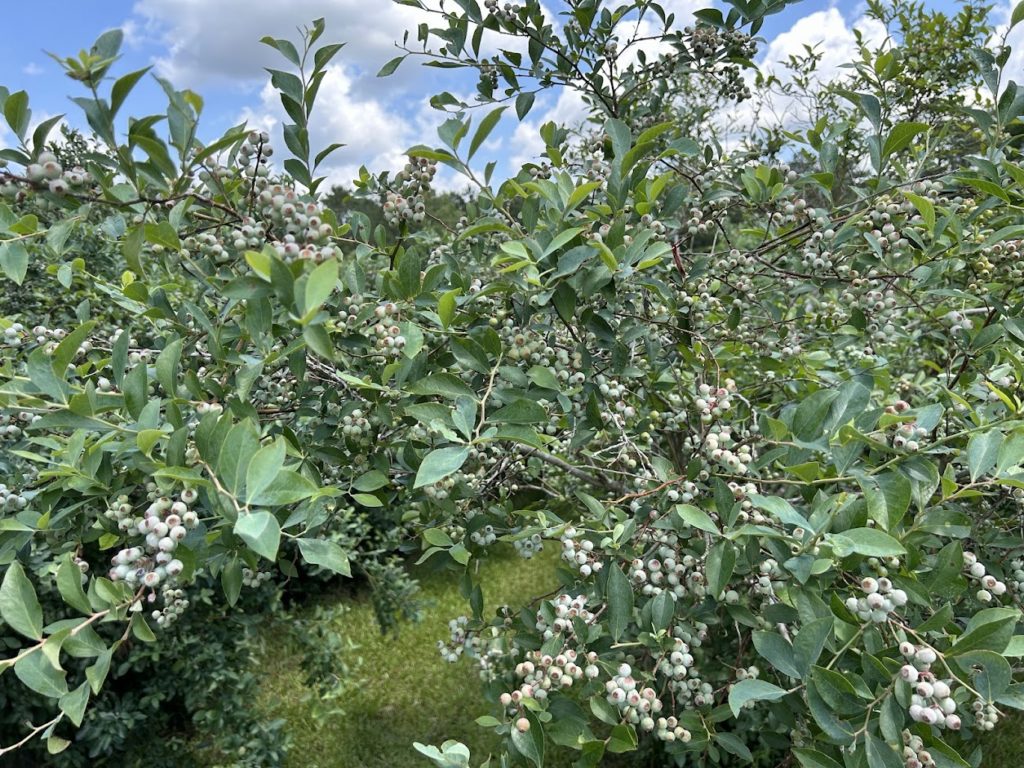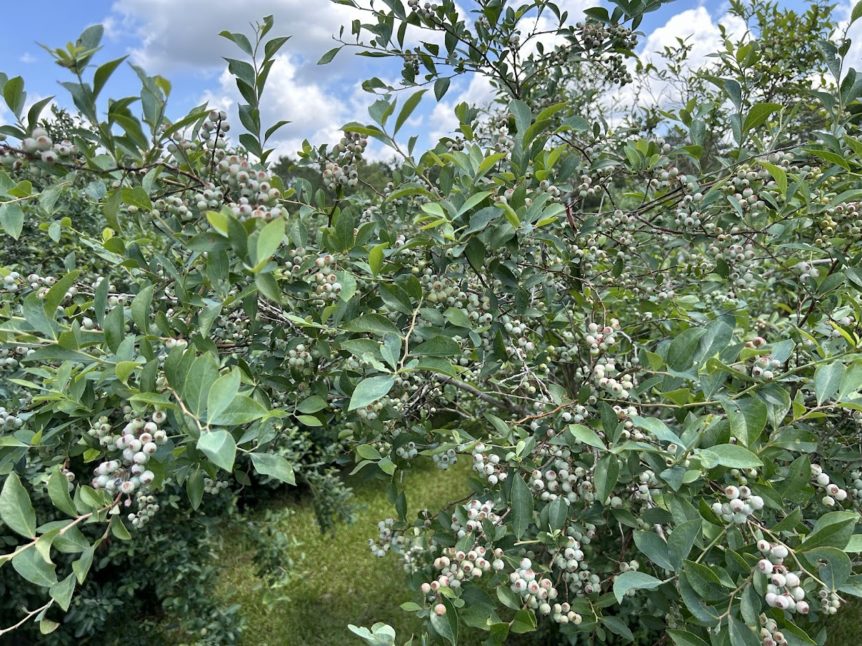
Weekly Field Update
Clemson Extension agents provide updates in The South Carolina Grower this week about the status of various crops being produced throughout the state.
Coastal Region
Anna Sara Hill
- The weather has turned hot, with some areas getting much needed rain the last part of the week. But other areas still need more. It appears Barnwell and surrounding counties have escaped the severe weather forecasted at the end of last week.
- Peaches and blueberries are continuing to be picked.
- Watermelon vines are looking good for the most part. We are seeing some thrips feeding on leaves and some deer damage in fields located near the woods. Thus far, disease pressure has been low in watermelons. However, with the rain and winds, spores will be washed around, so continue being vigilant with scouting and cover sprays. An interesting note is the genetic mutations that have been observed in a few watermelon vines. These phenomena were found in different fields across different varieties.
Zack Snipes
- We got some rain and had really nice weather for crops this past week. Everything is growing well, and many things are coming to market in heavy volumes.
- I found cucurbit downy mildew in cucumber on Johns Island last week. It seems that this disease is a few weeks early this year. All cucurbit growers, especially cucumber growers, need to take note and apply fungicides. Use the Southeast Vegetable Crop Handbook for specific recommendations. I am also finding some powdery mildew on squash, zucchini and cut flowers (zinnia).
- Tomatoes are very clean right now with very low incidence of bacterial spot and tomato spotted wilt virus. I have seen a few plants with bacterial wilt start to melt down. Grafted plants are the only way to prevent this disease, well that and not growing tomatoes…
Midlands
Rob Last
- Western flower thrips (WFT) are active in the Midlands and causing damage to both fruit and vegetable crops. When selecting insecticides, an important factor to consider is the selectivity of the insecticide. More selective insecticides will conserve the natural predators that feed on and help keep thrips populations in check. Spinosyn insecticides (Radiant or Entrust) are one of the few insecticide classes that are both effective against WFT and conserve beneficial predators. However, over-reliance on these will result in thrips resistance development, as in North Carolina tomatoes. Entrust, for example, has been shown in pepper trials in Florida, to conserve, minute pirate bugs (Orius insidiosus),an important predator of Western flower thrips. Data from Florida (Funderburk et al., 2000.) indicates that even in untreated plots, minute pirate bugs were able to manage western flower thrips populations. Preserving beneficials, such as minute pirate bugs, may not be the total solution in all crops to managing thrips but could play a part in helping to conserve the life of insecticides.
Phillip Carnley
- Tomatoes are looking great in the Midlands right now, with the only major issue being Southern stem blight. If Southern blight is identified, remove infected plants. Cabrio can be applied if infestation is high. A couple of fields have had a little herbicide drift causing leaf damage, but nothing they can’t grow out of. Be mindful of temperatures, wind speed and direction when spraying.
- Blueberries are coming in with excellent quality and quantity.
- Squash is continually being harvested. Here in the Midlands there has been a rise in thrips and aphids in squash. If you suspect thrips, you can sample with a sheet of paper or white cup. Take a bloom and shake it out over the cup or paper and inspect for thrips, as they can be difficult to see.
- The first plantings of cucumber are just coming into flower and fruit set and are looking great. Downy mildew has yet to be seen in the Midlands, but be very vigilant in scouting.
- Peaches are continuing to size nicely.
- Strawberries are still producing well, but there is plenty of fruit anthracnose still around, as well as phytophthora.
- Sweet corn is really coming into its own after the rain this past week. There are plenty of corn root worms hanging around.
- Watermelons are still looking good. There are some issues with weak stems from wind damage early. Cantaloupe is sizing very well with most fruit being between baseball and softball size. Once fruit begins to size, be mindful of your fungicide applications as they can cause burning of fruit.
Pee Dee
Brittney King
- We had a rainy week in the Pee Dee, with some areas receiving a total of 3 to 3.5 inches of rain for the week. The rain was a big relief to a lot of growers who were dealing with very dry soil conditions. Some fields did experience some water buildup in low areas. It will be important over the next week or two to be vigilant for signs of plant disease since most growers did not get a chance to spray anything last week.
- Strawberries are starting to wind down in some areas of the Pee Dee. I’m seeing some plants that just aren’t producing flowers anymore, and other plants have been completely taken over by crown and/or root rot. For those that are still harvesting, I am seeing a lot of fruit rot from the weather we had last week. For anthracnose fruit rot, FRAC 11 and FRAC 12 fungicides like Miravis Prime and Luna Sensation are effective once anthracnose has been diagnosed. Captan is a great multi-site fungicide that you can add to the rotation and help prevent disease resistance.
- Blueberries and blackberries are looking good. Blackberries are sizing up and getting their color.
- Muscadines are starting to bloom, which this is the time to watch for aphids found around the blooms. Treat aphids only if new growth is malformed. It is important to be aware of pollinator populations in your vineyard, and time insecticide applications for the late afternoon/evening. Now is a great time to put out an application of boron to make sure you have a good fruit set.
- Summer crops like peppers, watermelon, squash and tomatoes are growing well.
- I’m seeing lots of damage on leafy greens from imported cabbageworms. Not only do these caterpillars chew holes in the leaves, they will leave behind frass that collects in the center of the plant, making it unmarketable. Bt products like Dipel and Javelin are recommended for caterpillar control in leafy greens. Make sure to rotate modes of action to prevent resistance to insecticides.
Upstate
Andy Rollins
- Excessive rains have caused bacterial issues on multiple crops. I have just started finding bacterial spot on peaches. Copper applied at the 0.25 lb rate, and Fireline can be used to help with this. Timing is critical for getting control, especially ahead of rain. Growers need to continue thinning and keep up with spray applications. Scale crawlers, plum curculio and oriental fruit moth all are out at this point. Continue rotating your insecticide resistance groupings (IRAC groups).
- In strawberries, corn earworm, crown and fruit anthracnose, and root rots are prevalent in fields. Plants are producing, although total yields of many farms are below normal. Continue removing water damaged, over-ripened, and diseased fruit from the field, and keep a good high pressure spray program. Coragen is labeled and effective for caterpillars. Continued use of Captan, a protectant fungicide, is critical to maintain control of fruit anthracnose. The expensive systemics like Luna Sensation, Merivon, Miravis Prime and Switch all play a very important role as well and need to be rotated also.
- Tomato and pepper crops are in the ground and growing well. Many are just beginning early bloom.










